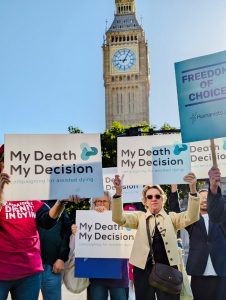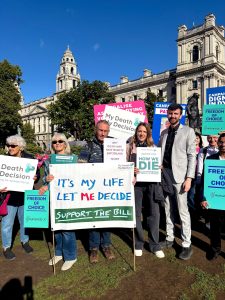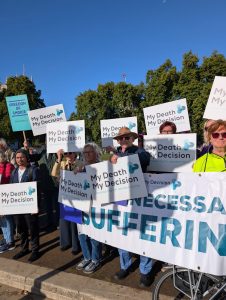 The Terminally Ill Adults (End of Life) Bill has completed the first day of its Second Reading in the House of Lords, a key stage of the Bill’s passage into law. The debate will continue on Friday 19 September.
The Terminally Ill Adults (End of Life) Bill has completed the first day of its Second Reading in the House of Lords, a key stage of the Bill’s passage into law. The debate will continue on Friday 19 September.
Lasting a marathon six and a half hours without pause, nearly 90 members of the House of Lords spoke during the first day of debate. With 180 peers expected to speak in total over the two days, this is set to be the longest debate with the most speakers of any Private Members’ Bill in history.
There were no votes in today’s debate, but peers may vote on some amendments next Friday.
Graham Winyard, Director of My Death, My Decision, said:
‘We welcome today’s debate, which was respectful, measured and reflected the public’s strong and consistent support for assisted dying. Many peers recognised that everyone deserves the right to make their own choices at the end of life, with compassion, and dignity.
‘We are grateful to those who engaged seriously with the evidence and with the voices of dying people and their families. This debate is an encouraging step forward, and we will continue working to ensure that the views of terminally ill adults remain at the centre as the Bill moves through the Lords.’


George Smith, whose mother took her own life in 2024, said:
‘My mum endured years of pain from Multiple Sclerosis and Trigeminal Neuralgia before feeling she had no choice but to end her life alone. It was heartbreaking for us as a family. Today’s debate shows the Lords are willing to confront this suffering and consider change. I hope that terminally ill people won’t have to face the same lonely decision my mum did.’
During the debate, several peers made passionate speeches in favour of assisted dying.
Lord Alf Dubs said:
‘Even if I disagree with the views put forward, I fully respect their right to be put forward. I would like to pay tribute to Kim Leadbeater, she has done a tremendous job, with tenacity, sensitivity and campaigning fervour, she deserves a lot of respect even if one does not agree with her views.
I cannot deny to others something that I would want to avail of myself. I would certainly want to avail myself of the Bill if my health had reached a position where I qualified for it.
The present position is surely unsafe, cruel and unworkable.’
Baroness Hayman said:
‘I am still haunted by the last conversation I had last year with someone very close to me, who was dying in the London teaching hospital, who had cared for him for many years with wonderful palliative care. The last thing he said to me was “every night I go to sleep I pray that I won’t wake up”
In a visit to Oregon, one of the things that struck me most, was to learn how many people asked for a prescription for the drug to end their life but didn’t actually use it. It was around 40%. That’s been a pretty constant figure, it is common and has been replicated in other jurisdictions. If we change the law, it will affect more people than the 1% who have an assisted death. I think that is a good thing. It will give tremendous comfort and courage to many people with terminal diseases, knowing that if worst comes to the worst, if palliative care can’t help them, they have an option they can choose to take.’
Lord Mohammed of Tinsley said:
‘I speak in favour of this legislation because it’s fundamentally about choice and compassion, it’s not about compelling anyone to act against their conscience. It’s about giving individuals and families the ability to decide how they spend their final days, whether they have faith or no faith.
I would not personally choose assisted dying and nor would any member of my family. Our faith teaches us to endure life until its natural end, and we would respect that. My personal decision or that of my family should not mean that others who hold different beliefs or different choices are denied the ability to act according to their own conscience.
Lord Dobbs said:
‘A nurse wrote to me: I have never met a nurse or a doctor who is eager to end the life of any patient. But I have known many nurses and doctors who want to end their suffering. I hope and pray, she says, that the law will change and I will not be subjected to the laws dictated by those who do not agree with me.
My Lords, I wish I had had the opportunity out of love to help my mother pass peacefully in my arms. Instead of watching her years of suffering, it would have been her choice, but she had no choice. And instead I’m left with an enduring memory of endless pain.
Baroness Primarolo said:
‘Denying the ultimate right to end one’s life in peace and dignity when the alternative is so scary and appalling is not being compassionate. We need to facilitate this bill. When I was a health minister, I was reminded of complex human interactions when we try to legislate. We took on the challenge in the embryology bill, got the details right, and did not delay the choice of those who seek the bill.
It is a travesty, and ultimately wrong, for the state or any other agent of civil society, to intervene with or impose their values above the right of the individual of self-determination in circumstances where there is no perverse impact on the community. In democracy, we must trust individuals to make informed decisions about their own bodies and lives.’
Notes
For further comment or information, media should contact Nathan Stilwell at nathan.stilwell@mydeath-mydecision.org.uk or phone 07456 200033.
Humanists UK and My Death, My Decision have people and their loved ones who would be affected by this change available for the press.
We recognise that any assisted dying law must contain strong safeguards and the international evidence from countries where assisted dying is legal shows that safeguards can be effective. We also believe that the choice of assisted dying should not be considered an alternative to palliative care, but should be offered together as in many other countries.
My Death, My Decision is a grassroots campaign group that wants the law in England and Wales to allow mentally competent adults who are terminally ill or intolerably suffering from an incurable condition the option of a legal, safe, and compassionate assisted death. With the support of over 3,000 members and supporters, we advocate for an evidence-based law that would balance individual choice alongside robust safeguards and finally give the people of England and Wales choice at the end of their lives.
Humanists UK and My Death, My Decision are both members of the Assisted Dying Coalition, along with Friends at the End, Humanist Society Scotland, and End of Life Choices Jersey.

